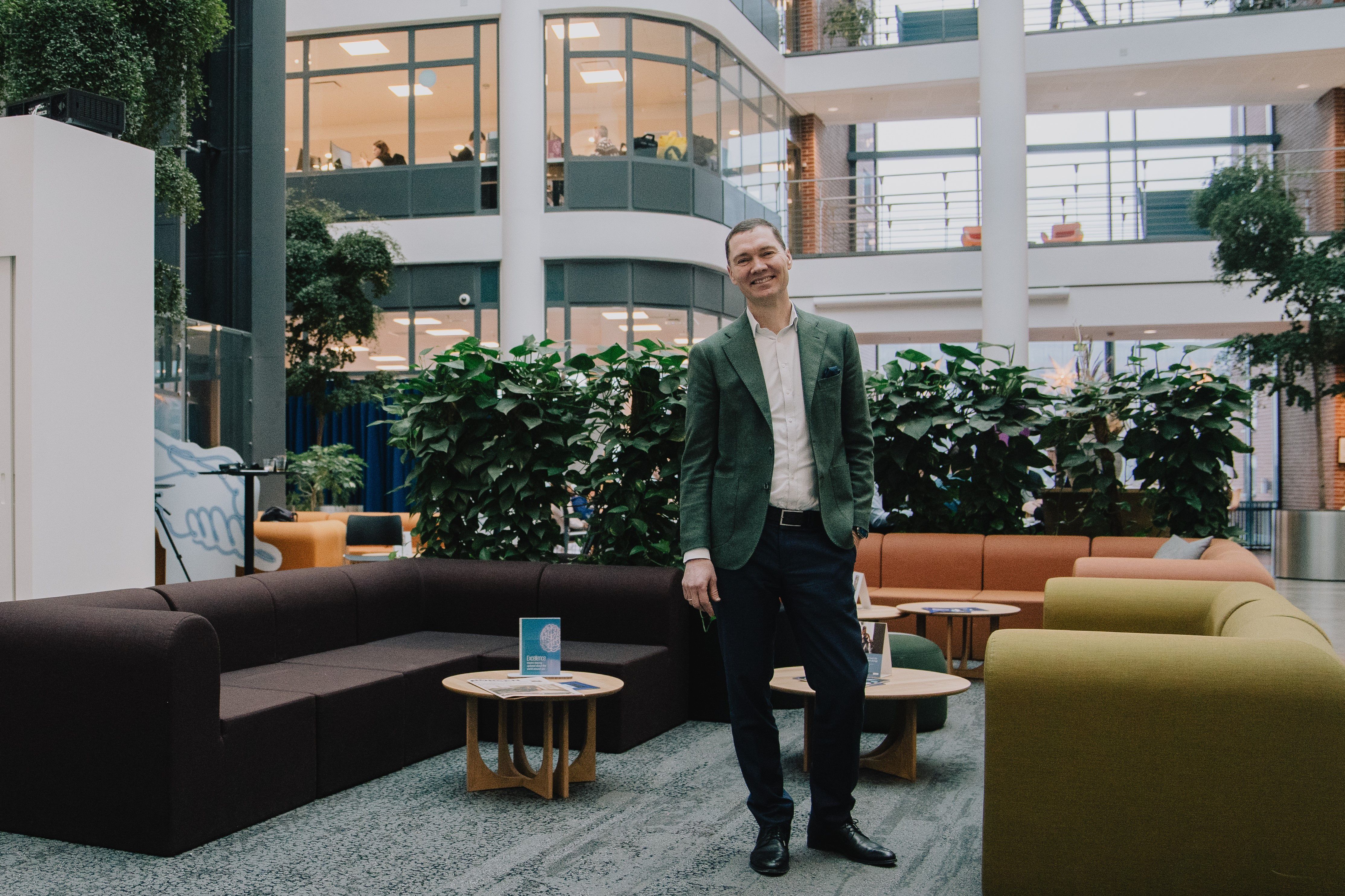Bent Dalager is a Partner, the Head of Innovation and the founder of KPMG NewTech at KPMG and has been in the company for seven years. Bent has a background in Computer Science (AI) and further education at Harvard and MIT. He has extensive experience with digital transformation, AI, automation and quantum tech across multiple industries, including deep insight into the financial industry. He is the host of KPMG’s podcast TechTalk and is also Head of KPMG’s Global Quantum hub. Externally he is the Head of IT-Branchen’s NewTech Policy Board. Co-founder of Danish Quantum Community Digital Wiseperson at the Academy (ATV), member of the professional data ethical council and member of FSA’s (Finanstilsynets) Fintech/AI advisory committee. He also teaches AI at both CBS and Børsen’s Board Education and at INSEAD Executive MBA.
Can you tell us a bit more about KPMG Trusted AI?
Bent: Trusted AI is KPMG’s strategic approach and framework to designing, building, deploying, and using AI solutions in a responsible and ethical manner. The approach rests on 10 core pillars across the AI life cycle: fairness, transparency, explainability, accountability, data integrity, reliability, security, safety, privacy and sustainability. We use this approach when implementing AI, however it will become increasingly important in the coming years, now that the EU has passed the AI Act (AIA) – and clients will look to us to help them ensure these principles are respected. For if they aren’t, they risk a heavy fine of up to 7% of their revenue, or 40 million Euro!
What these principles mean essentially is that the AI model goes through intense screening and testing: how easy is it to break into the model – is it secure and robust? Is the data that it is using reliable and allowed? Is the model tested on a large group, so the results don’t get skewed and are fair? Is it using the correct data at all? How much energy does it use? The aim is to trust your AI with the results it gives you, and have it operate in an ethical and reliable way. It will require companies to have a solid risk system to control their AI processes, if they use AI in so-called High risk areas (everything that can have a large impact on an individual: health, job, credit, law, etc) - but there’s time to get ready, the act will only take effect in 2026.
"Trusted AI is KPMG’s strategic approach and framework to designing, building, deploying, and using AI solutions in a responsible and ethical manner"


What difference does AI make and what does its future look like?
Bent: AI makes a difference by making our individual work lives easier, more rewarding and more meaningful, by removing tedious tasks that can easily be automated. But AI also benefits society as whole. We worked together with Nets some years ago on creating an AI-powered anti-fraud engine that assists prevention teams to block fraudulent transactions, which is an improvement that is felt every day for Danes, without any interference. We caught 40% more fraud with no extra false-positives.
Looking at the next five years, AI will have a more profound impact as we will experience AGI, Artificial General Intelligence. The “G” here is going to open up more possibilities to reach into existing systems that are independent to the AI model. If a student wants to apply for a student loan, but doesn’t know where to start, they could ask AGI to create that application for them. The AGI will in turn ask for permission to access the student’s net bank or social security platform, confirm the wording of the application, and research which files are needed to proceed. It will provide us with even better assistance than the questions/answers format we see today. Already now we see generative AI being a sparring partner and problem solver for all kinds of work related to text, sound and pictures.
What is something you'd like to challenge our perspective on?
Bent: With the rise of new technologies, especially AI, we need to rethink the way our work is organised. For the last 100 years, we have sought to constantly optimise processes and reduce costs, using various methodologies to get there. Some call it LEAN, others best practice. ’
However, we should aim to organise work in a NewPractice way. When working with AI, you should avoid mimicking the human process, which means replacing existing tasks with AI, because you won’t reap the benefits that AI can give you – you only make the process slightly more efficient while making the process landscape more complicated. Instead, flip the process on its head: get AI to run it, and then have humans support it. As the AI model becomes more intelligent, we can give it more work while bringing down the costs. In LEAN/Best Practice, extra work is expensive because it’s performed by humans so it should be minimised, but in NewPractice, extra work is almost free of charge and we can even add work and bring down costs at the same time. So always think AI first, then map where humans can support, not the other way around.
The second point I’d like to challenge is the phrase “Think Big, Start Small and Scale Fast”. Do not think of the big plans first. For any change to happen, you need to be curious and curiosity should transpire from all levels in an organisation. If your ambitions are too big, it will delay you from getting started, which is the most important aspect in any technology adoption. Take the baby steps first and experiment. Then you know what you are dealing with and can Think Big. So my credo is “Start Small, Think Big and Scale Fast”.
KPMG in Denmark is running KPMG’s Global Quantum Hub. What can we expect from quantum tech in the future?
Bent: Yes, we’re really proud of hosting the Global Hub. Last summer, KPMG joined IBM’s Quantum Network to further explore the opportunities that quantum brings, together with other companies, so I’m excited to see where this partnership takes us. This is on top of the Partnership we have made with Microsoft in the Quantum area.
We’ll need to wait about 10 years for quantum hardware to really take off, The quantum computer does exist, but it’s still error-prone, so for now, it’s difficult to use for production purposes, but it can be used for experiments and within the next couple of years, it will be possible to use it in production in certain areas like chemistry exploration and general optimisation.
However, quantum linear, a specific quantum computer that is only able to solve optimisation problems, is a tool that can be used today to optimise very complex processes, which would be nearly impossible for a regular computer to undertake. The great thing is that companies like Microsoft have been able to simulate such a quantum computer. This makes it possible to use quantum algorithms on top of a classic cloud, like Azure.
Let’s take the example of a telecommunications company installing and fixing internet by car on a vast territory. The likelihood that those cars will need to reroute their itinerary is high, and when 1,000 cars are being used, a quantum algorithm is able to calculate where every car should go, and can save more than 25% in gas consumption, simply by optimising the itineraries. I can work so fast that if an incident occurs, a recalculation can be made very quickly.
So the impact of quantum is – and will be – significant and a threat at the same time. When the classic Quantum Computer will be sufficiently big and stable, it will be able to break more than 50% of all existing cryptography that we use every day. Where a PC will use about 2,000,000 years to break it, it will take a Quantum computer less than 2 minutes. Institutions and companies with confidential data that must stay confidential for more than 5 years, will need to take action today to counter that threat.
How would you describe KPMG’s culture?
Bent: I think we have an open and young-at-heart culture. This year we’re celebrating our 10th anniversary and we often talk internally about how much has happened since 2014: it’s exciting to be a part of something that is growing so fast and where you really have an impact on the culture, the projects you work on, decision-making – regardless of your position at KPMG.
As the Head of Innovation, I do my best to instil a culture of curiosity and starting small – to encourage our people to try different things. We’re taking our own medicine and implementing the solutions we sell to our clients, for example with automating processes, streamlining processes with ServiceNow, and having access to our own Generative AI tool, AdvisoryGPT. Overall, it’s a great place to be and to grow.
"It’s exciting to be a part of something that is growing so fast and where you really have an impact on the culture"
Bent Dalager
Partner and Head of Innovation & NewTech
KPMG in Denmark


